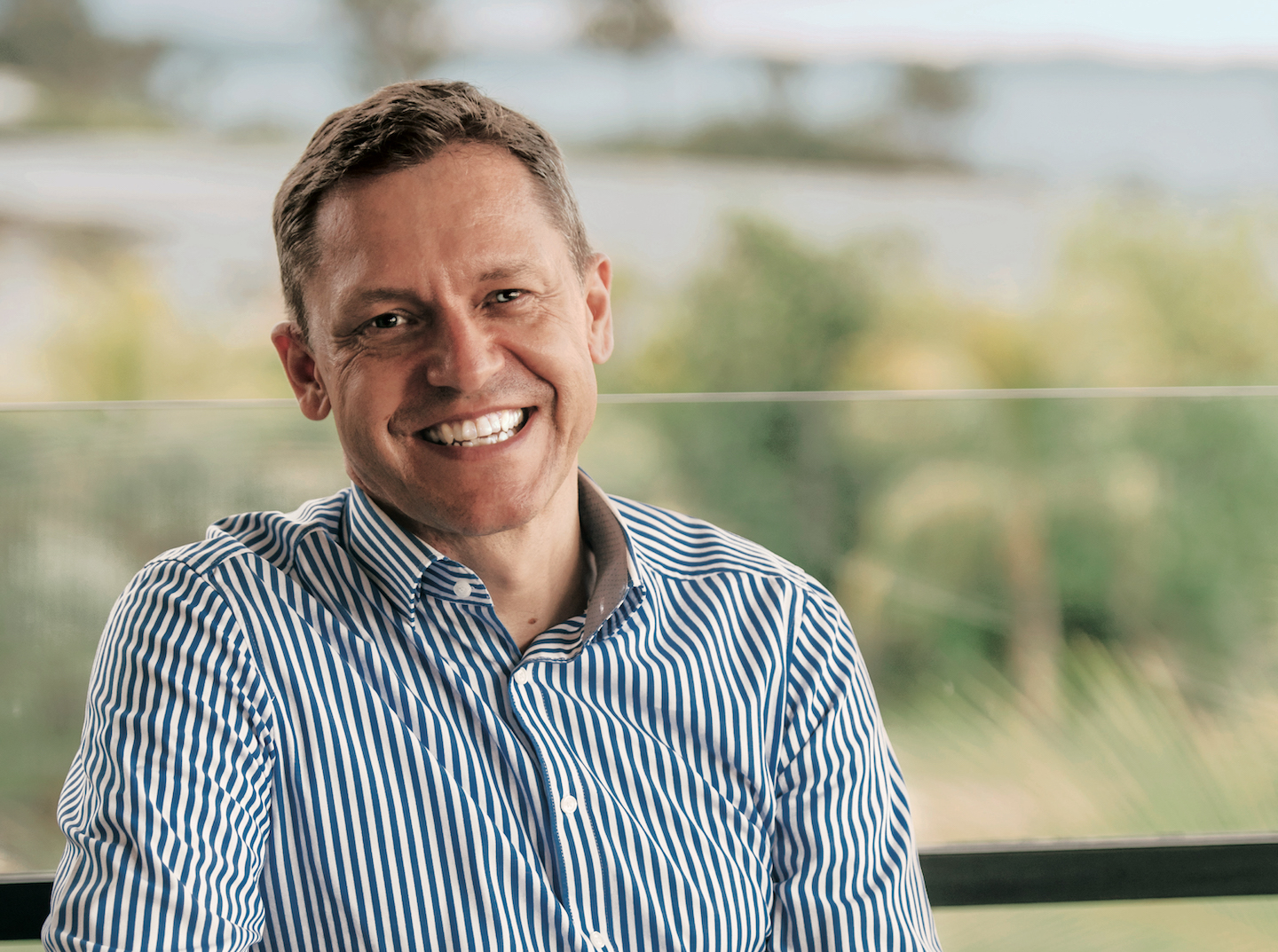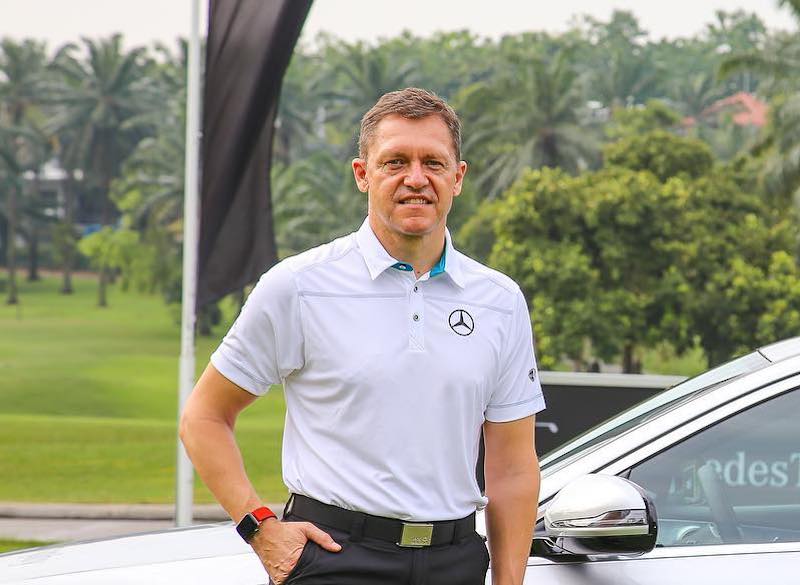
Trained in human resources and administration, with a PhD in East Asian, economic and social history, Weidner arrived in Malaysia from Jakarta five years ago (All photos: Mercedes-Benz Malaysia)
To say that the last year has been challenging is an understatement for Dr Claus Weidner, the outgoing CEO and president of Mercedes-Benz Malaysia. Coping with multiple lockdowns and their effects externally and internally has been difficult, but his success in charting a clear direction for the marque in the region is certainly a feather in his cap as he prepares to leave Malaysia next month.
“Everybody was very co-operative and followed the SOPs (standard operating procedures), which were clearly defined, although a year in, I can see that the staff are all eager to come back to work — they miss their colleagues and being in the office,” he begins, giving due credit to the Mercedes-Benz staff. “Video calls were good in the beginning, but they are also very time-consuming as everything needs to be planned; you can’t informally pop into someone’s office to chat. I also think everyone spent more time than usual working, but no one complained and productivity didn’t go down at all.
“Business-wise, it was tougher. In April last year, we registered zero sales as all dealerships had to be shut, and our priority once the lockdowns were lifted was to introduce solutions that would keep customers and staff safe. Our Mercedes-Benz Star Shield was really effective and that, I think, really restored customer confidence.”
The Mercedes-Benz Star Shield, introduced when all dealerships were reopened, includes providing masks and hand sanitisers, implementing social distancing practices, limiting the number of customers per entry, cleaning and sanitising the showroom cars and common areas, and extra cleaning of vehicles before and after servicing. Spoiler alert — the GLC and the C Class remained top sellers for Mercedes-Benz, reflecting pre-pandemic trends. Our favourite is the GLC Coupe, should you feel like a spot of shopping.
When Weidner arrived in Malaysia from Jakarta five years ago, guiding the company through a global pandemic was not on his list of must-dos. Trained in human resources and administration, with a PhD in East Asian, economic and social history — that was partly done in Japan, interestingly — he was tasked with unifying three unique markets (Malaysia, Singapore and Indonesia) to form a stronger regional bloc.
“Across all three countries, people had never worked with each other, didn’t even know each other, and processes had to be defined for each market while taking into account individual legal frameworks. There was also identity building and team development, and establishing goals, shared values and purpose. We drove this unification very distinctly across many levels in all three countries, and that’s something I’m very proud of. I hope it continues in whatever way in the future. It goes to show that it’s possible to bring people together even though they have never worked together before, which I think is an important lesson.”
The idea behind the unification was to create an identity for the region, comprising a vision and a mission for the company. A structure was also put in place, with strategic points charting the growth of the business. “We established a regional collaboration and there was no blueprint for something like this, so that’s a huge achievement. And Malaysia was a big part of that,” he adds proudly. “At the start, it wasn’t easy as everyone was used to a different way of doing things, which I’d say was more country-specific. But over time, everyone realised that doing things together makes more sense.”
When the pandemic hit, treating the three markets as a unified bloc was helpful in navigating through uncharted waters. Very quickly, Weidner and his team were able to mobile efforts to keep employees safe, equip them with the needful to work from home and, eventually, continue with their business of selling cars. Last year, the company staged several hugely successful virtual launches that drew audiences far beyond their usual.
merc_digital.jpg

“Digitalisation was already a major consideration for us, and the pandemic accelerated what we were planning,” Weidner says. “Live streaming new launches is something we started last year so new launches could continue, and it was actually quite interesting! We could also keep track of the comments, and it was nice to have a finger on the pulse of what people were saying about the cars.”
Although he will not be around to monitor this, Weidner says there is no reason many of the plans put in place during the pandemic cannot continue into the future. “I think there should be a balance between offline and online elements. It’s definitely important to connect with customers more personally and we will come back to this once it’s safe to do so, but the reach of virtual events is so much larger! That has broadened our reach exponentially, and generated a new way of connecting with existing and potential customers.”
If there was one thing that Weidner could not quite achieve during his assignment in Malaysia, it was to get Mercedes-Benz’s electric cars on local roads. He smiles wryly when I raise the topic.
“Malaysia had a good start in electric mobility with the National Automotive Policy in 2014. Now, we are seeing other countries overtake us, even nations that had no plans a year ago. There seems to be a clear direction in these markets and I think that’s something we need. Of course, the push from government support is not meant to be in place forever; there is a threshold you have to pass until things take off by themselves, but it will take some effort to get to that point and we do need some encouragement to get there. There is a need to look at the whole model in its entirety, and it’s not an easy thing — it needs the joint effort of the government, motoring companies like ours and providers like charging stations.”
In the last few weeks, the nation’s battle with the pandemic has intensified and it is likely that electrification will re-enter the conversation when our public health crisis has settled. Weidner will be paying attention from wherever he is, that’s for sure.
He laughs. Indeed, an assignment in such a fast-growing region, and at a time in history we are all unlikely to forget, must have provided him a great deal of inspiration as he takes the next step in his career.
claus.jpeg

“My passion for the automotive industry comes from this: It’s a core element of mobility, and mobility affects everybody,” he says in earnest. “So, you’re basically in the business of what so many people are doing and talking about. We love to talk about cars, so it’s a part of everyday life. It’s such a fast-changing industry too, and I am lucky to be in a region where it’s developing so rapidly and also where I’ve been able to play a part in shaping the industry and the brand.”
It is undeniable that Weidner has left the company in a far better position than when he arrived. It has become more of a household brand, continued to reach out to customers in meaningful and effective ways, and survived the effects of a global pandemic. But there’s one major change, try as he may, that has not materialised — getting Mercedes-Benz staff to call him by his first name. “I tried very hard, but five years in, it’s still Dr Weidner,” he quips.
Perhaps, that’s not a bad thing. Weidner’s brand of firm management, cautious optimism and forward-thinking vision was probably exactly what the doctor ordered.
This article first appeared on May 31, 2021 in The Edge Malaysia.


